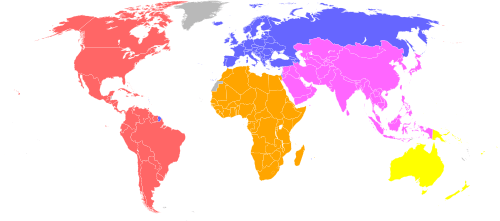FINA Women's Water Polo World Cup
The FINA Women's Water Polo World Cup is an international water polo competition contested by women's national water polo teams of the members of FINA, the aquatic sports' global governing body. The tournament was established in 1979 with an erratic schedule, was contested every two years from 1989 - 1999, and has been contested every four years since 2002.[1]
Results
Medal table
.jpg)
Gillian van den Berg won the competition in 1999 as part of the Dutch team. In the photo she is seen celebrating her gold medal at the 2008 Summer Olympics.
| Rank | Nation | Gold | Silver | Bronze | Total |
|---|---|---|---|---|---|
| 1 | 8 | 3 | 1 | 12 | |
| 2 | 4 | 5 | 1 | 10 | |
| 3 | 3 | 4 | 5 | 12 | |
| 4 | 1 | 1 | 3 | 5 | |
| 5 | 1 | 0 | 3 | 4 | |
| 6 | 0 | 2 | 1 | 3 | |
| 0 | 2 | 1 | 3 | ||
| 8 | 0 | 0 | 1 | 1 | |
| 0 | 0 | 1 | 1 | ||
| Totals (9 nations) | 17 | 17 | 17 | 51 | |
Participation details
- Legend
- 1st – Champions
- 2nd – Runners-up
- 3rd – Third place
| Team | 1979 (5) |
1980 (4) |
1981 (4) |
1983 (4) |
1984 (4) |
1988 (7) |
1989 (8) |
1991 (8) |
1993 (8) |
1995 (8) |
1997 (8) |
1999 (8) |
2002 (8) |
2006 (8) |
2010 (8) |
2014 (8) |
2018 (8) |
Years |
|---|---|---|---|---|---|---|---|---|---|---|---|---|---|---|---|---|---|---|
| 3rd | 4th | 3rd | 3rd | 1st | 5th | 5th | 2nd | 4th | 1st | 3rd | 2nd | 6th | 1st | 2nd | 2nd | 3rd | 17 | |
| 8th | 1 | |||||||||||||||||
| 4th | 3rd | 1st | 4th | 3rd | 4th | 4th | 6th | 5th | 5th | 3rd | 7th | 5th | 6th | 14 | ||||
| 4th | 8th | 3rd | 4th | 5th | 5 | |||||||||||||
| 7th | 7th | 8th | 3 | |||||||||||||||
| 6th | 1 | |||||||||||||||||
| 6th | 8th | 7th | 6th | 7th | 5 | |||||||||||||
| 2nd | 3rd | 3rd | 3rd | 4th | 1st | 5th | 6th | 5th | 9 | |||||||||
| 8th | 5th | 2nd | 5th | 4th | 3rd | 5th | 2nd | 8 | ||||||||||
| 6th | 7th | 2 | ||||||||||||||||
| 8th | 8th | 2 | ||||||||||||||||
| 2nd | 1st | 2nd | 1st | 3rd | 1st | 1st | 1st | 1st | 2nd | 1st | 1st | 12 | ||||||
| 5th | 4th | 6th | 7th | 8th | 8th | 7th | 7 | |||||||||||
| 7th | 1 | |||||||||||||||||
| 4th | 2nd | 7th | 4th | 3rd | 4th | 6th | 2nd | 8 | ||||||||||
| 7th | 1 | |||||||||||||||||
| 7th | 8th | 2 | ||||||||||||||||
| 3rd | 4th | 2 | ||||||||||||||||
| 1st | 2nd | 4th | 2nd | 2nd | 4th | 2nd | 3rd | 5th | 6th | 7th | 6th | 2nd | 4th | 1st | 1st | 1st | 17 |
gollark: Well, they can just be plugged into something, or have a GTech™ infinite energy orb, but this is rare.
gollark: This means that they require energy stored in batteries, capacitors, etc. to run.
gollark: Calculators are generally electronic devices.
gollark: Yes, it's redundant when HelloBoi knows all information.
gollark: Metaclasses good, as they say.
See also
References
External links
This article is issued from Wikipedia. The text is licensed under Creative Commons - Attribution - Sharealike. Additional terms may apply for the media files.
